

 The South African
The South African
'The war at Transvaal rests invisible to them (other nations) and nothing is known to them of it but what the English, and the English only, want to tell the rest of the world.' (Le Petit Journal, 5 November 1899)
About the author
Aaron McKenna Kent received both his BA and MA degrees from Texas State University in 2003 and 2005 respectively. His MA thesis was entitled, 'The BoerWar: Changing Perceptions of Empire.' In this work he explored the changing nature of identity within the Empire with an aim to understanding 'Englishness'. He is currently in his third and final year of a PhD program at the University of Leeds in England. His dissertation is entitled' Understanding Britishness: The Jewish Community of Leeds 1890-1920.' With a focus on migration and war, his research explores the impact societies and cultures have on one another, thus continuing a theme first explored during his MA work.
Heightened emotions and rabid attacks in the pro-Boer press of Britain did not prevent the war with South Africa in 1899. In fact both may have accomplished little more than to hide serious inadequacies within the British Army. The government, the army and the citizens expected a short and decisive win in the Transvaal. W T Stead (October 1899, p333) wrote that the creation of the war by the government was 'disreputable, contemptible, and discreditable'. However, other than pro-Boer activists, most British citizens believed that a small state in Africa stood no chance against British might. The press in London portrayed the British public as generally supportive of the notion of going to war. The Daily Mail blamed the conflict on Transvaal President Paul Kruger's defiance; The Standard assured its readers that the government had done its best to avoid war; and The Daily Chronicle suggested that Kruger was 'shifty and impracticable'. A war against the Boers appeared justifiable to most imperialists and to many Britons.
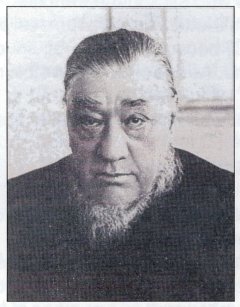
President Paul Kruger of the Transvaal Republic (Photo: By courtesy, SANMMH)
INITIAL TROOP STRENGTH
In early August 1899, Colonial Secretary Joseph Chamberlain requested 10 000 troops be sent as a show of force. Despite the ease with which the British soldiers grouped themselves in South Africa, they faced two problems: They were unaccustomed to a war of this type, and the military was woefully ill prepared. Based on a government study, the British Secretary of War, Edward Stanhope, suggested that Britain was not prepared forthe troop movements required. The lack of preparation was no secret and filled newspaper columns at home and abroad. By the end of September, more than 25 000 British soldiers were in Africa or on their way there. The army consisted of twenty-five battalions and almost 130 big guns (Carver, 2000, pp12-14; 'Great Britain cannot recede', New York Times, 1 October 1899, p10). The reputation of British regulars was enough for many in the government to assume this number would be sufficient to suppress a Boer uprising.
The initial field strength of the Boer commandos was far greater than that of the British but was not perceived by the War Office as a threat. It was assumed in London that about 50 000 men could be mustered in the many Boer commandos. This number took into account all men from sixteen to sixty, but many could not leave the farms for extended periods. Britain felt comfortable sending a comparatively smaller force, with the assumption that its trained men would more than compensate for being outnumbered. (On the first day of the war, the Boers fielded 35 000 men, which was more than twice the available British contingent strength. They also benefited from superior artillery procured from the Germans). In his efforts to sell Chamberlain - and, in effect, the British public- on the war, Milner neglected to mention his fears concerning Boer fighting capacity. He had hidden his concerns in order to usher in public support for a quick and uncomplicated war. They had not taken into account Kruger's stockpiling of weapons, a measure he had actively pursued for years. Within a month of the war's commencement, the Boers were still purchasing weapons from abroad. The volunteers' duty was to protect the homeland from the colonizing British, and there was little initial trouble finding men willing to carry weapons purchased with Rand gold.
Extreme anti-British sentiment throughout the world also fuelled a migration of sorts to South Africa. Foreign nationals who had any type of disagreement with the British flocked to South Africa to fight. As the war began, France's Le Petit Journal (19 November 1899) exclaimed,
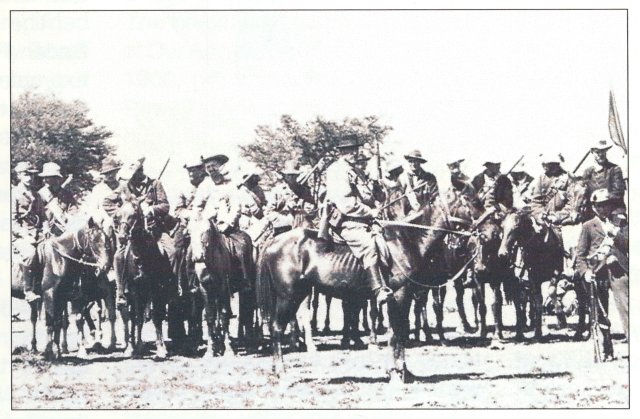
Men of the Hollander Corps mobilise in support of the Boers,
October 1899 (Photo: By courtesy, SANMMH).
Kruger and his generals knew that more British troops were on their way. Initial Boer strategy was to defeat and demoralize the ones already on the continent and to set up suitable positions from which they could defend the veld from British advancement. The Boer commandos practised classic partisan warfare and the friendliness of the locals towards their brother Boers enabled ease of movement and the collection of provisions. Moreover, it was this seemingly disorganized approach to battle that allowed such great success at the start and helped maintain itforthree years as the major cities fell and Kruger was forced from the country. The best way to instill fear in the enemy is to give him the sense that he is surrounded, that no relief is possible, and that the war is already lost. Kruger's generals set about doing this before the ultimatum even expired. In cutting off Kimberley, Ladysmith and Mafeking, the Boers had a brief chance to defeat the contingent of local British troops and, with it, the British will to pursue the conflict. In taking these towns, the Boers sent a clear message around the world - an important message in the battle for public support. Thousands of well-trained British soldiers were trapped by armed farmers and were rendered impotent, unable to do much more than maintain their positions. Britain's European counterparts found comfort in mighty Britain's powerlessness. The Boers were heartened at their success and emboldened to continue the fight. Buller's initial plans were thwarted as troops were redirected to break the sieges until more men could arrive in the spring of 1900. Putting Britain on the defensive was a smart move and it allowed the pendulum of success to swing towards the Transvaal, if only briefly. The Boers had already won the initial psychological victories.
The race to affect morale in Britain with the news of the sieges was fast. The Times reported a lack of adequate information on military exercises and suggested that the clear losses were by no means final and that the public should withhold judgment until the complete story was understood. But when The Times printed that article, Sir George White, commander at Ladysmith, had lost over forty officers and almost 1 500 enlisted men in defence of the town on what became known as 'Mournful Monday', 30 October 1899. The Times attempted to bolster domestic support by suggesting that 'reverses' in warfare often happen, but that the entire nation remained resolute behind the troops (The Reverse at Ladysmith', The Times, 1 November 1899, p1). Language such as this was parroted across the pro-war papers in order to aid the enlistment drive and prevent disenchantment. The most glaring problem, however, was the instinctive response to defend the war at any cost. The argument for sustaining the conflict was made without regard to facts and with the suggestion that available facts be ignored while the government made efforts to offset the losses.
The besieged towns of Ladysmith, Kimberley and Mafeking were largely isolated from the outside world. Isolation distorted the information revealed to the press and added weight to the cynical comments of Le Petit Journal. Trouble mounted for the British, and it was important that citizens back home did not realize it. White had 12 000 men in Ladysmith, Robert Baden-Powell had only 600 at Mafeking, and Rhodes was cut off from the world at Kimberley with just 3050 men (Carver, 2000, pp23-5). These numbers were insufficient compared to those in the many Boer commando units of over 3 000 men each, which roamed the hills cutting off supplies and shelling the towns intermittently.
MIXED SIGNALS
Although the British soldiers felt trapped within the besieged towns, they found some release in journals and in letters sent home. A brief inspection of their concerns during the autumn of 1899 will help clarify the difference between the war on the ground and the one portrayed by pro-war papers. Captain Christopher Balfour wrote home from Ladysmith on 30 October, suggesting that the situation was disastrous. His battalion had lost men and supplies, and many mules (invaluable in the war) had been killed. He wrote, 'There are thousands of Boers ... who have every modern weapon.' His desperation was clear when he complained that the Army Corps had not yet arrived, and a 'wicked waste of life had consequently ensued' (Carver, 2000, p21, quoting the diary of Christopher Balfour, 60th Rifles). The siege at Ladysmith lasted for over two hundred days, weakening the spirit of many. On his way to relieve Kimberley, Lieutenant Harry Pryce wrote, 'I'm afraid we have another big fight in front of us, we are all pretty sick of it' (Carver, 2000, pp28-9, quoting the diary of Harry Pryce-Jones, 1 st Coldstream). He further bemoaned his situation, his group having already lost dozens of men, hundreds of horses, and many officers. The war was barely a month old and soldiers were already feeling the strain.
It was not just the soldiers but also civilians who felt the initial pinch of siege and deprivation. Linden Bradfield Webster, a young child during the siege of Mafeking, reminisced: 'We were about 2 000 strong (including us boys) and at one stage we had 12 000 Boers around us. What would we have achieved by going out to fight them?' He also spoke of the hardships and lack of food faced by soldier, and white and black civilian alike, and wrote, 'Horse meat, of course, was a regular part of our diet. So was mule and donkey meat ... we had to eat the hide as well' (Linden Bradfield Webster, http://rapidttp.com/milhist/vo/017/b.htm/, accessed 3 November 2004). The nurses at Ladysmith suffered similarly, 'Our rations were daily: 50z cornmeal, 1/2lb bread or two biscuits, a third of an oz of tea, a fifth of an oz of sugar, 1/2lb of meat ... in times of reserves, our rations were cut down to a quarter of this amount (Katherine Louisa Nealon, http://rapidttp.com/milhist/dianurse.htm/, accessed 1 Nov 2004).
MAFEKING AND MYTH
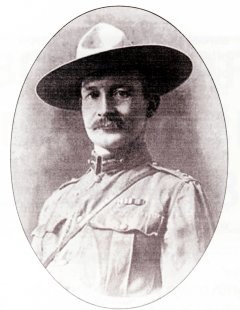
Robert Baden-Powell, defender of Mafeking.
This is the image used in the British press to defend
and promote the War in South Africa.
The story of Mafeking under Baden-Powell is an especially good example of creative storytelling on the part of the press, and it is relevant to the notion that opinions were manipulated throughout the war. Carefully orchestrated press releases, official reporting, and limited access for non-combatants allowed Baden-Powell to become one of the war's most memorable figures. A small and hitherto unimportant town near the Transvaal border, Mafeking became integral to the war in Britain and Africa. Baden-Powell was given most of the credit for retarding the Boer plans during late 1899 and early 1900. Perhaps much of his enduring fame can be attributed to writers such as Arthur Conan Doyle, who wrote: 'Under ordinary circumstances any force shut up there was doomed to capture. But what may have seemed short-sighted policy became the highest wisdom, owing to the extraordinary tenacity and resource of Baden-Powell, the officer in command' (Arthur Conan Doyle, 1902, Chapter 24). Moreover, Baden-Powell's reputation was maintained throughout the war. It was the crafting and maintaining of this reputation by government officials and the pro-war press that gives a clearer understanding of the dual nature of the war.
The Boer general, Piet Cronje, with almost 8 000 men, besieged Mafeking in October 1899. Women and children who wished to leave were already gone and the British soldiers had already dug dozens of trenches. British numbers were far lower and there were questions about their abilities ('The War's Probable Course', New York Times, 15 October 1899, p2). Day after day Baden-Powell sent small detachments to prod the Boers and to keep them off balance in order to prevent all-out assaults. From the beginning, there were obvious discrepancies in reporting. There was combat on 14 October, resulting in losses on both sides. The British immediately reported that they had killed over fifty Boers while injuring an equal number, but an English doctor with the Boers reported that only two had been killed. A correspondent for a local paper reported sixty Boer casualties. Reports varied and were highly questionable. As the New York Times reported (The News Condensed', 17 October 1899, p1), the war 'was a matter of conjecture'. A clear image of what Baden-Powell was doing was impossible to obtain.
A careful study of The Times during the spring of 1900 makes no mention of this situation. Yet the Daily News (The Siege of Mafeking', 26 April 1900, p5) praised black people who 'were so loyal to the last to the nation which had protected them against the Boers'. This grand image no doubt sparked increased support from citizens convinced that Britain was on a humanitarian mission. Fewer than two paragraphs later the writer referred to the porridge the men were forced to eat, suggesting there was plenty to last the 'citizens' (the white population), until May 1900. Baden-Powell's reputation continued to grow as his questionable decisions were overlooked and under-reported.
The siege of Mafeking perpetuated the general perception of the noble soldier fighting in Africa. The Weekly Dispatch ('The Deeds of Our Army in South Africa', 13 May 1900, p4) wrote that 'his [Baden-Powell's] fine spirits and thoughtful humanity are as inexhaustible as his courage and resourcefulness' and that he 'was human character at its best - at once both noble and gentle'. His reputation increased enthusiasm for further news of successes against the Boers. When relief finally came to Mafeking, the day became a national holiday. The Daily News cited the Birmingham City Council (Chamberlain's hometown) as it praised Baden-Powell and his comrades for upholding the proud traditions ofthe British Empire. The image of Baden-Powell and his soldiers was trumped up to assure support for the war against the Boers. It was this support that kept the fire of war burning through the autumn of 1899 and into the early spring of 1900. (For further reading on the violence incited on 'Mafeking Night', see Richard Price, 1972, Chapters 2-4).
DARKEST DAYS OF DECEMBER
Stories of the soldiers had begun to trickle out, and the losses and hardships were far greater than expected. Characteristically, The Times led the pro-war press in praise for the army. Despite reports of greater than expected casualties and the shattered plans of Buller, the editors saw fit to proclaim that 'all is well' and that Mafeking and Kimberley could easily hold out for months ('Ladysmith can hold out for months', The Times, 20 November 1899, p11). The fighting was hard-hitting work for the British soldiers in the winter of 1899. In what became known as 'Black Week', the British suffered three devastating defeats that sent both the troops and the public reeling. The face of the war changed and the conceptions the British public held underwent forced reconsideration. From 10 to 17 December, the British lost over 3 000 men and an entire battery of field guns. This disappointment was not lost on the troops nor the citizens at home.
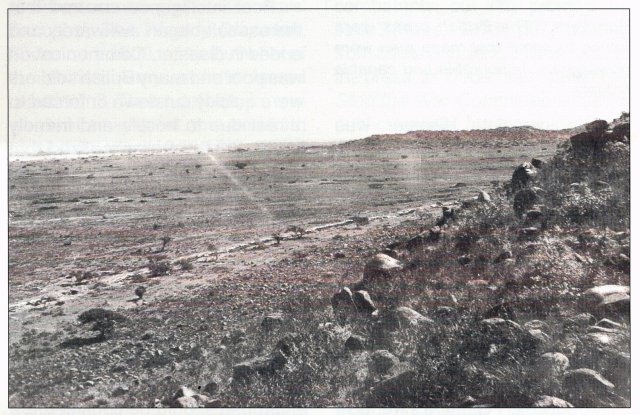
The battlefield of Magersfontein, indicating the position of the Boer trenches
at the foot of the hill (Photo: By courtesy, SANMMH).
The first major battle was at Magersfontein on 10 December. Poor planning and incorrect assumptions about the enemy's position forced a night march of the Highlanders under the leadership of Major-General Andrew Wauchope. Three Highlander battalions, including the Black Watch, the Argylls, and the Seaforths, marched in formation, holding knotted rope across the unfamiliar and trench-filled veld, towards the assumed Boer position. Igniting the night with gunfire, the Boers quickly pinned down the confused and battered Highlanders. The next nine hours brought an odd mixture of terror and boredom for both sides as British soldiers were forced to lie motionless for fear of being killed. Their nerve weakened and some were ordered to retreat for regrouping, but the withdrawal quickly became a bizarre scene of wind-blown kilts as hundreds fled the field. One officer exclaimed, 'I saw a sight I hope I may never see again: men of the Highland Brigade running for all they were worth ... cowering under bushes ... lying under blankets, officers ... threatening to shoot them' (Pakenham, 1979, pp213-4). When the battle was over, the Boers had lost 236 men and the Highlanders over 900, including their general, a great majority of whom had died with their backs to the Boers (Pakenham, 1979, p214; The Times, 8 January 1900, p3, stated that Boer sources widely reported the losses as over 2 000).
Despite the distance and difficulty in relaying news, word of the disaster reached Britain quickly. The first real blow to the British was delivered in expected patriotic tones. The Times (The Repulse at Magersfontein', 14 December 1899, p6) gave an honest, if not muted, rendition of the battle but rounded off its initial report with traditional praise of the Empire. The writer spoke of widespread patriotism and reminded the government of its duty to further encourage this zeal. The Weekly Dispatch (1 December 1899, p4) was less positive and recommended reprimands forthe generals involved. The writer questioned the wisdom of fighting the Boer at a site chosen by the Boer. Letters to The Times ('Magersfontein', 11 January 1900, p2) echoed the sentiment in hoping generals would learn from such big mistakes. The generals did eventually learn, but it was too late for the next two battles of 'Black Week'.
The second great defeat for Britain was at Stormberg. The British lost almost 700 men to another group of well-provisioned and disguised Boers. General Gatacre led a group of less than 3 000 soldiers, who were camped thirty miles (48km) south ofthe Boer position at Stormberg. Lacking provisions and operating under full strength, Gatacre decided to advance without adequate support or reconnaissance. The men marched across the veld straight into an attack by well-hidden marksmen in the hills of Stormberg. Ill-prepared and surprised, Gatacre ordered his men to charge the hills rather than to retreat. Those who survived were required to find shelter among rocks at the foot of the hills. Retreat was impossible because the British soldiers had marched themselves to sleep. Both British officers and Boers awakened sleeping soldiers on the roadside; often the men did not care which, because escape from the battlefield was a relief regardless ('Boers wearing British uniforms', The Weekly Dispatch, 14 January 1900, p2).
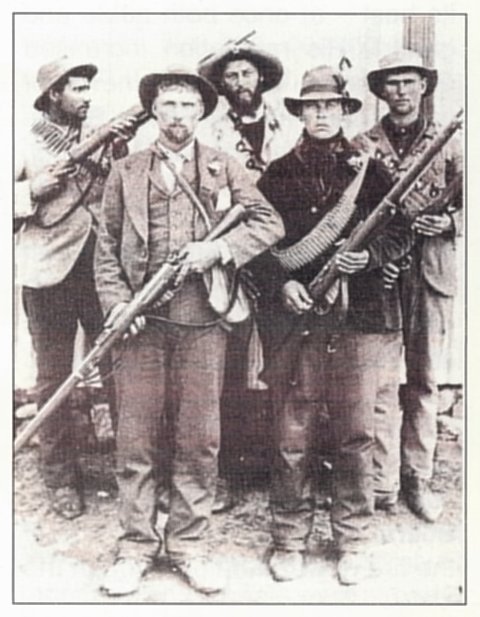
Burghers. The British press were forced to admit that these men
were courageous, honourable and capable fighters.
The complete disaster was described much differently in the pages of The Times. Its correspondent, traveling with Gatacre, suggested that the plan was clear and well organized. He did not highlight the inferior intelligence, but focused on familiar themes of British ability and military tradition. He wrote that a British victory would have prevented criticism of Gatacre, but that a series of accidents had halted success ('Gatacre's Repulse at Stormberg', The Times, 18 January 1900, p10). The men had marched through the night, many dropping from heatstroke during the day, only to be ordered up against a fortified hill. It was not realistic to expect victory (Carver, 2000, p40, quoting from the diary of Col R E Allen, East Yorkshire Regiment). The New York Times ('British Meet Severe Reverse', 11 December 1899, p1) cited the article in The Times but continued further by revealing Gatacre's mistakes as bold print sub-headings, rather than small appendices to the story like in the London paper.
The loss at Colenso was the climax of the string of failures dealt to the British Army in December 1899. Tactical and numerical losses were great, but these paled in the reaction to the shockwave that reached the shores of Britain. The Crimea was the last time Britain had been defeated so decisively. With almost 21 000 troops, Buller attempted to take Colenso and its rail line. As with the previous battles, Colenso was fought on Boer terms. The land was open and all attacks had to be carried out without cover. It was a disaster from the beginning. Despite the river to be crossed, the thousands of well-hidden Boer marksmen, and the questionable information, Buller ordered the assault on 15 December.
Poor intelligence ensured that the assault began awkwardly and ended in disaster. Communication was poor and many British soldiers were quickly cut down or forced to retreat due to hostile and friendly fire. By 08.00, Buller realized that continued action was unwise and ordered a retreat. The hurried change in strategy only added to the confusion. Captain Henry Warre wrote to his father: 'I feel almost too depressed to give you an account of our doings' (Carver, 2000, p45, quoting from private letters of Henry Warre, 3/60th Rifles). He further reasoned that, if anything, the enterprise should be considered a 'severe check' and that he was sure that the people at home would agree with him. What made matters worse was that Buller suggested that White surrender Ladysmith. This was an action equal in gravity to the losses at Colenso. White refused, arguing, that '[t]he loss of 12 000 men here would be a heavy blow to England. We must not yet think of it' (Doyle, 1902, Chapter 11 , Dispatch sent by Sir G White to Sir R Buller, 16 December 1899). This courageous decision saved the troops and citizens from further heartbreak. The shocking defeat, chronicled by Doyle, bluntly showed '[a] British General, at the head of 25 000 men, recommending another General, at the head of 12 000 men only twelve miles [19,3km] off, to lay down his arms to an army which was certainly very inferior in numbers to the total British force' (Doyle, 1902, Chapter 11 ).
With over 1 000 men killed, wounded and missing, this completed a week of disaster for the British Army and sent the supportive public at home reeling.
A NATION REACTS
By the end of December, the British public awaited explanations and a change of fortune for the troops. Buller suggested that his men had not learned the value of scouting and, that by walking into Boer territory unprepared, they were punished accordingly ('Our Generals' Excuses', The Weekly Dispatch, 28 January 1900, p11). But what of the British Army and its famed reputation? Three defeats in one week, at a high cost, threatened to crush the national will of Britain and the morale of its soldiers. The pro-war press tried to be forgiving, but it was no longer quite so easy. The Weekly Dispatch ('A Disgraceful Story', 28 January 1900, p10) exclaimed that the Empire had sent out an 'insignificant force' and that the Army was 'built on a system of the most expensive and doddering imbecility'. Such an explosion of defeats against the Boers brought outrage. The Times (The Battle of Colenso', 17 January 1900, p4) began to give credit to Boer successes rather than to continue traditional methods of down playing their abilities. Kruger's commandos were finally revealed to the reading public as capable and expert opponents. The New York Times and many other international papers reported the defeat as a rout ('Buller Routed', New York Times, 16 December 1899, p1). The insular period of the war had ended, and a better plan to win the wars in Africa and Britain was needed.
A turning point had unmistakably been reached when The Times felt comfortable attacking the government and Edward Carpenter's remarks on government jingoism proved accurate. He said the wave of enthusiastic imperialism would soon subside, and an 'odd looking mudbank [left] behind - and on it the word Conscription' (Koss, 1973, p54, quoting from Edward Carpenter's pamphlet, Boer and Britain, 1 January 1900). Writer Silas K Hocking wrote to the general press that 'no one can any longer doubt the courage or the skill of either of the combatants, but why prolong the strife?'(Koss, 1973, p67, quoting from Silas K Hocking's open letter to the press, 24 December 1899). The Stop the War Committee issued a public request for the war to end. They concluded with the assertion that if Britain finished the war it would mean: The sacrifice of the lives of 20 000 of our brave men; The slaughter of at least as many brave Boers; Hard times for the poor at home; Dislocation of Trade; Increase of Taxation; The waste of £100 000 000 of our hard earned money; And in the end, CONSCRIPTION.' (Koss, 1973, p70, quoting from the Stop the War Committee pamphlet, Stop the War! An Appeal to the People).
CONCLUSION
Both the government and the Queen attempted to assuage the British public. Queen Victoria stated: 'Please understand, that there is none depressed in this house. We are not interested in the possibilities of defeat. They do not exist' (Churchill, 1956, p461). Damage control on the part of the government was underway as were attacks from the left. The Stop the War Committee charged that '55 000 children are driven every day hungry and underfed into the public schools of Britain due to the expense of the war' (Koss, 1973, p 75, quoting from the Stop the War Committee pamphlet, The War Blight on Social Reforms). The war must be finished, but how and at what cost? The complacency of Britain began to erode as further troops arrived in South Africa. Thus, this article comes full circle with regard to the comments quoted at its beginning from Le Petit Journal. The imperialist press and the government had quietly, yet conscientiously, worked hard to prevent any negative aspects of the war from emerging. They had created the war on largely questionable grounds. The obvious lack of troops and the disasters of 'Black Week' broke the silence. The government was forced into an arena of public discourse to justify the war and to encourage new troop enlistment. Major events in 1900, such as the taking of Pretoria and the Jingo Election, had a positive effect on the government's desire to continue the war, but the nation found itself immersed in bitter self-analysis. The world watched as Britain was checked in its colonial mastery. The opening months of the second AngloBoer War in 1899 encouraged the Boer independent spirit and shook the resolve of Queen Victoria's empire. The emergence of heated and public debate at the domestic and international level changed the face of warfare and diplomacy at the dawn of the twentieth century.
BIBLIOGRAPHY
Return to Journal Index OR Society's Home page
South African Military History Society / scribe@samilitaryhistory.org